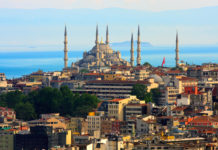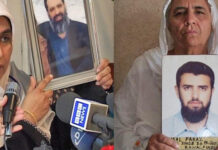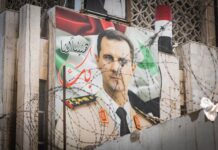Latest reports out of Iraq confirm that the “Islamic State of Iraq and Sham” (ISIS) have taken over Mosul, Iraq’s 3rd largest city and the largest city in the north of Iraq, writes Eisa Ali.
Situated in Ninevah province, the city has long been a base of ISIS and has been a stronghold for supporters and remnants of the previous Baathist regime of Saddam Hussain. Some analysts believe that senior figures in ISIS had major links to the Saddamist regime, including the leader of ISIS Abu Bakr Baghdadi.
They have long since attacked government troops in hit-and-run and suicide attacks but, until now, have never launched an attempt to control the whole city. Analysts contend that Mosul has always been ISIS’s main base and that the group funded its activities through a Mafia-style extortion racket enforced on local businesses and factories.
This is in addition to the oil fields it controls in Eastern Syria and the funding it receives from mainly private donors in Saudi Arabia and the Persian Gulf nations like Kuwait and Qatar.
Reports also state that upon taking control of Mosul, they took millions of dollars of currency from Government offices, not to mention the millions of dollars sitting in banks inside the city. Add to this the tens of millions of dollars worth of military equipment seized from the abandoned army bases in and around the city and from Mosul Airport. Fighter jets, tanks, helicopters, uniforms, heavy and light weapons and all manner of vehicles are now under the control of ISIS.
Iraqi government officials confirmed early on Tuesday that Iraqi army forces withdrew from the city after being over-run by ISIS militants. In reality Baghdad is in chaos and seems to have no strategy to deal with the situation. Iraqi TV is playing patriotic songs repeatedly on loop, running updates along the news bar at the bottom of the screen only.
The head of Parliament, Usama Nufaifi, who has spent much of the past year criticizing the army in its fight with ISIS and its Baathist allies and trying to block them from receiving weapons and other equipment, today slammed that same army for withdrawing.
Subscribe to our newsletter and stay updated on the latest news and updates from around the Muslim world!
Nouri al Maliki
The Prime Minister Nouri Al Maliki has called for Parliament to declare a state of emergency, but to what end? To give his government more powers? He has already taken control of the security levers of government, he controls the Defence and Interior ministries. There isn’t much power left to give him.
Maliki has been hamstrung by a corrupt and divided state, a left-over from the occupation which established the spoils system of dividing political power. He has also shown a remarkable lack of competence, or any semblance of a coherent plan. After 8 years in power, he has not one single security gain to show for in that time.
To symbolize this incompetence, Iraqi soldiers manning checkpoints are still using “bomb detectors” that have been proven to be complete fakes. Last year, James McCormick, a British businessman, was jailed for 10 years for selling golf ball detectors to the Iraqi government and telling them they were bomb detectors. To this day, the Iraqi officials responsible for buying them are still in their jobs and the detectors are still in use, all to save face for those officials.

Who knows how many lives this ego-saving exercise has cost in the last decade?
Latest reports suggest that Parliament will hold an emergency session on Thursday. It is incredible to think that it will take until then to convene parliament while the 3rd city burns. Many MPs live abroad, perhaps they need to wait in order to charter flights in from Dubai?
As of Tuesday afternoon, ISIS are reportedly moving on Tikrit, the hometown of Saddam and another stronghold of Baathist loyalists, as well as targeting Baqubah, Sammarah and Ramadi. By the time Parliament sits on Thursday, these predominantly Sunni regions of Iraq could have fallen to ISIS and ISIS convoys could be gearing up for an assault on Baghdad.
Late last week, ISIS launched expeditionary attacks on Samarra, home to the Askariyan Shrine, holy to millions of Shia Muslims. Columns of vehicles with mounted weapons entered the city from the south. They withdrew after encountering stiff resistance from the Iraqi Army and other irregular forces but were still in control of some parts of the East of the City as of the weekend. They launched assaults on Mosul the next day as well as in other predominantly sunni towns and cities.
This achieved many aims. It threw the Iraqi army off-balance while it tried to anticipate where the next attack would come from. It also led the army to be stretched thin. This allowed the current takeover of Mosul to succeed. It also helped ease the pressure on ISIS in Fallujah, which has been surrounded by the army with varied success for the last 6 months. It remains to be seen whether this siege can be maintained.
Iraqi army
The army has for long suffered from morale problems. In late 2012, ISIS (then simply the Islamic State of Iraq, before it established itself officially in Syria) began releasing videos of hit-and-run attacks on Iraqi soldiers. These included attacks with silenced guns on soldiers while they slept in isolated outposts and checkpoints in places like Haditha and Mosul.
For young soldiers, many of whom hail from the south, being far away from family and constantly at risk of being murdered doesn’t seem appealing. During these attacks, the militants would seize vehicles, weapons and uniforms. They would then launch attacks on security forces while themselves dressed as soldiers, confusing the victims before it was too late to respond.

This went on to become a regular tactic of ISIS, with a recently produced video showing them setting up fake checkpoints while dressed as soldiers, and executing government officials and off-duty soldiers. There are claims that these videos have been seen by the many of rank-and-file in the army, acting as a form of psychological war.
There have also long been reports of corruption among higher ranking army personnel, who sell equipment destined for the soldiers on the black market. The central government is racked with corruption and a lack of a cohesive strategy designed to fight the threat from ISIS and her Baathist allies.
During the sunni protests held throughout much of 2013, the soldiers would consistently come under attack from the “peaceful” protestors, who would throw rocks and bricks at their vehicles. For many locals, their presence wasn’t welcome. It isn’t hard to see why the soldiers abandoned their positions without putting up much of a fight, with defeat certain.
While Gulf donors are allowed to continue openly funding ISIS and Turkey continues to allow its territory to be used as a transit point for jihadists going into Syria and then Iraq, it is hard to see how ISIS will be driven from Mosul. If ISIS begin to make real inroads that allow it to launch an assault on Baghdad, then it is certain that the largely dormant Shia militias will activate their fighters to protect Shia holy sites and civilians.
ISIS fighters are parading the streets of Mosul, with their black flags draped on their vehicles. Kurdish forces from the Peshmerga are said to be finally engaging ISIS to the east of the city, having looked the other way for years, while thousands of people are streaming out of the city as refugees, unsure as to when they’ll ever return.
For the “international community,” which caused this situation with the systematic destabilization of neighboring Syria, there is now the very real prospect of a Wahabist Caliphate controlled by ISIS stretching across north and east Syria to North and West Iraq, sitting on Europe’s doorstep. However they respond, one thing is clear; the immediate future for Iraq is very dark.









![24 Hour Road Trip Through Free Syria [Short Film]](https://5pillarsuk.com/wp-content/uploads/2025/02/IMG_5907-218x150.jpg)












